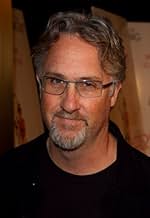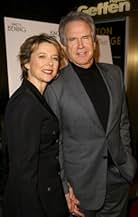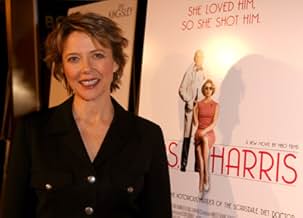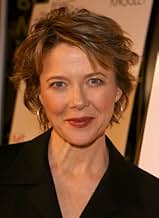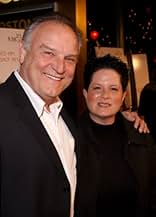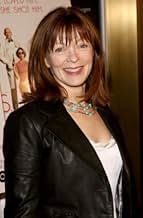NOTE IMDb
5,9/10
1,6 k
MA NOTE
Ajouter une intrigue dans votre langueBased on the sensational 1980s media event, famed cardiologist Herman Tarnower meets a particularly brutal end at the hands of his jilted lover, Jean Harris.Based on the sensational 1980s media event, famed cardiologist Herman Tarnower meets a particularly brutal end at the hands of his jilted lover, Jean Harris.Based on the sensational 1980s media event, famed cardiologist Herman Tarnower meets a particularly brutal end at the hands of his jilted lover, Jean Harris.
- Réalisation
- Scénario
- Casting principal
- Nommé pour 12 Primetime Emmys
- 6 victoires et 35 nominations au total
Lawrence O'Donnell
- Judge Leggett
- (as Lawrence O'Donnell Jr.)
Avis à la une
My husband and I sat through 20 films this year and this one, along with Michael Haneke's "Cache," was by a long way the best and the most surprising we saw. You go to a gala at a film festival and you're prepared for mostly safe stuff chock full of movie stars, so many of them, like curios in cabinets ("Walk the Line" and "North Country" are two such examples; there are others), that you lapse into a deep sleep just looking at the credits, knowing the exercises in taste and decorum that will follow. I wasn't encouraged by the cast list of "Mrs. Harris" but was really interested in the whole Jean Harris story so along we went to the screening.
For those of you who are not familiar with the tale, this is the murder of the Scarsdale Diet doctor saga in 1980. Jean Harris was an uptight headmistress who, so the media spun it at the time, in a fit of jealous rage drove from Virginia to New York in a blinding rainstorm and pumped the doctor full of bullets because he wanted to marry another woman.
What seems like a pretty straightforward narrative turns out to be anything but that, principally because of the way the story is told in this version and the incredible performances, not just from Annette Bening, though I have never seen such subtlety from this actress but also from Ben Kingsley, Cloris Leachman, Frances Fisher, Mary McDonnell and a host of others in truly perfectly judged cameos.
The first-time writer and director of "Mrs. Harris" never judges the characters and thus wisely puts the responsibility for making any judgments solely in the laps of the audience. The tonal shifts in this film are dizzying but never confusing and perhaps the most brilliant thing about it is the way in which you're seduced into laughing at or with all the insanity and then immediately are shown something that makes you question why you laughed in the first place.
It's not an easy ride or the most comfortable of films to watch, but it's one of the finest depictions of obsession, dependency and love gone wrong I've seen in a long time. It's not for everyone. My husband, who also loved it, had a heated debate with another couple we saw it with who hated it and mostly hated it because of the way it refuses to score easy victim versus villain points. It's divisive and from time to time you wonder about certain shots or the juxtaposition of certain scenes but these are minor quibbles. This is a debut feature that outclasses most of what I've seen in multiplexes this whole year. Go if you want to think and feel as a result of that thinking.
I heard a rumor that the film is not going to be released in movie theaters but will air on HBO. That, if true, is a pity because it's something that should be seen and the performances, writing and direction are first rate.
For those of you who are not familiar with the tale, this is the murder of the Scarsdale Diet doctor saga in 1980. Jean Harris was an uptight headmistress who, so the media spun it at the time, in a fit of jealous rage drove from Virginia to New York in a blinding rainstorm and pumped the doctor full of bullets because he wanted to marry another woman.
What seems like a pretty straightforward narrative turns out to be anything but that, principally because of the way the story is told in this version and the incredible performances, not just from Annette Bening, though I have never seen such subtlety from this actress but also from Ben Kingsley, Cloris Leachman, Frances Fisher, Mary McDonnell and a host of others in truly perfectly judged cameos.
The first-time writer and director of "Mrs. Harris" never judges the characters and thus wisely puts the responsibility for making any judgments solely in the laps of the audience. The tonal shifts in this film are dizzying but never confusing and perhaps the most brilliant thing about it is the way in which you're seduced into laughing at or with all the insanity and then immediately are shown something that makes you question why you laughed in the first place.
It's not an easy ride or the most comfortable of films to watch, but it's one of the finest depictions of obsession, dependency and love gone wrong I've seen in a long time. It's not for everyone. My husband, who also loved it, had a heated debate with another couple we saw it with who hated it and mostly hated it because of the way it refuses to score easy victim versus villain points. It's divisive and from time to time you wonder about certain shots or the juxtaposition of certain scenes but these are minor quibbles. This is a debut feature that outclasses most of what I've seen in multiplexes this whole year. Go if you want to think and feel as a result of that thinking.
I heard a rumor that the film is not going to be released in movie theaters but will air on HBO. That, if true, is a pity because it's something that should be seen and the performances, writing and direction are first rate.
For anyone who remembers the shooting of the Scarsdale Diet Doctor at the hands of the school mistress from Madeira, the fancy girl's school in Potomac, MD, this film is a soap opera scandal which should have been allowed to rest in yellowing newspaper clippings (though those are probably on line now in incorruptible digits). Annette Bening is Mrs. Harris, the abandoned and lovelorn teacher. Bening is a fine actress and while she succeeds in bringing her character to life, all that is accomplished is to demonstrate once again that Mrs. Harris was pathetic. Kingsley has much less to work with and all he is able to demonstrate is that Herman (Hy) Tarnower was an unmitigated son-of-a-bitch, which we already knew. Why did Ellen Burstyn and Cloris Leachman allow themselves to be roped into this? One assumes for the money, certainly not the art. Could this have been a better picture? Given the facts of the case, which are reproduced more or less as they were presented at the time, I would guess not. Neither of the principals has much of a back story to be unpacked and, while the details of the murder made headlines for days at the time, at the end of the day it's merely a sad, sordid, essentially uninvolving tale.
If you look at this movie as humorous you'll soon see that it is a very dark comedy. It is sometimes sly and subtle, sometimes almost burlesque(the locker room scene) but always not taking itself too seriously. "We never fought except about the use of the subjunctive!" C'mon. I think Ben Kingsly always kept the comedy aspects of his character in mind and played it very broadly. This movie has what must be by far the most oddly matter-of-fact murder scene ever filmed. I think if you are old enough to remember when this was on the news it will enhance your appreciation of it. Watching people thought to be upper class brought low has been fodder for comedy since theater began.
The incident in which this HBO film is based upon, was fodder for the sensational press during the time it was front page news. Phyllis Nagy adapted the material for the screen, as well as directed. Ms. Nagy makes a point for not taking sides in the way this tale is presented. Jean Harris plays the most important part since, after all, she was the only one that lived to tell her story. How much of it is fiction, and how much it is true?, let the viewer arrive at his own conclusion.
The basic problem with this ambitious production is the casting of the two principal characters. Annette Benning, obviously acting on the text Ms. Nagy wrote, comes across as a silly woman. We don't get to see a dignified Jean Harris, or at least the woman one saw in pictures, and on the television news. Ms. Benning is a good actress, as she has proved herself in other films. Jean Harris, alas, is not one of the best roles she has played.
Ben Kingsley, the wonderful English actor, plays Dr. Herman Tarnower, the victim of Jean Harris' jealousy. Mr. Kingsley's take on this doctor is not convincing. His Dr. Tarnower comes across as a man who had a roving eye for attractive women of a certain class, which is what made him fall for Mrs. Harris, to begin with. According to Ms. Nagy, this doctor had an indecisive nature paying more attention to his mother when she bluntly questions why is he marrying the poor Mrs. Harris.
The opening credits show us how other women, at least in film noir, have dealt with men their own way. What Ms. Nagy's screen play does is to take the viewpoint that maybe Mrs. Harris didn't intend to kill Dr. Tarnower, at all, when the facts of the case tell us she fired a few shots during that fatal encounter.
The basic problem with this ambitious production is the casting of the two principal characters. Annette Benning, obviously acting on the text Ms. Nagy wrote, comes across as a silly woman. We don't get to see a dignified Jean Harris, or at least the woman one saw in pictures, and on the television news. Ms. Benning is a good actress, as she has proved herself in other films. Jean Harris, alas, is not one of the best roles she has played.
Ben Kingsley, the wonderful English actor, plays Dr. Herman Tarnower, the victim of Jean Harris' jealousy. Mr. Kingsley's take on this doctor is not convincing. His Dr. Tarnower comes across as a man who had a roving eye for attractive women of a certain class, which is what made him fall for Mrs. Harris, to begin with. According to Ms. Nagy, this doctor had an indecisive nature paying more attention to his mother when she bluntly questions why is he marrying the poor Mrs. Harris.
The opening credits show us how other women, at least in film noir, have dealt with men their own way. What Ms. Nagy's screen play does is to take the viewpoint that maybe Mrs. Harris didn't intend to kill Dr. Tarnower, at all, when the facts of the case tell us she fired a few shots during that fatal encounter.
Having read Jean Harris' autobiography, as well as other materials on this case, I thought Annette Bening's portrayal of Jean Harris was excellent. She was Jean Harris. Ben Kingsley's performance was also excellent--he was given little to work with beyond witty/smug remarks/situations yet to his credit he was able to exude the charm that Tarnower reportedly had, and the chemistry between the Tarnower and Harris was obvious, which made their connection believable. I was drawn to this movie as a fan of both Bening and Kinglsey, and the chemistry between these two very charismatic actors did not disappoint.
What was bothersome was that the film seemed to fluctuate between serious drama and intentional camp. This made it difficult to get too involved in the story or feel empathy for the characters, which is often what people look for in a film of this genre. Even the soundtrack (which was excellent on its own) was used to this endjust when I was getting drawn into Harris' "withdrawal-induced perspective, a pop song from the 70's (was it Bread?) pulled me right out of it. But the more I thought about it (and read some viewer comments on this site) the more appropriate this approach felt. After all, the whole appeal of this story to the public was that a highly successful physician and the Headmistress of a prestigious boarding school were involved in a rather tawdry situation. Two highly educated, superior-acting, society folks who took themselves *way* too seriously were involved in affairs, drugs and cheap catfights. If the shooting scene at the beginning of the film seemed ridiculous and unbelievable, well, that was exactly how Jean Harris described the events herself. So after much consideration, I think that some aspects of the film that other viewers here have criticized were perhaps an effort by the filmmakers to underscore the absurd in this story. This makes "Mrs. Harris" not the typical murder drama/documentary and definitely worth seeing.
So comes down to this: Great cast, great performances (the cameo performances as well) and it accurately portrays the complexities of the situations and the people involved in this story. It is also somewhat disturbing--you won't leave with a feeling that justice was necessarily served, or that anything was really resolved, or with any sense of empathy for the characters. But hey, that's what happens in real life.
What was bothersome was that the film seemed to fluctuate between serious drama and intentional camp. This made it difficult to get too involved in the story or feel empathy for the characters, which is often what people look for in a film of this genre. Even the soundtrack (which was excellent on its own) was used to this endjust when I was getting drawn into Harris' "withdrawal-induced perspective, a pop song from the 70's (was it Bread?) pulled me right out of it. But the more I thought about it (and read some viewer comments on this site) the more appropriate this approach felt. After all, the whole appeal of this story to the public was that a highly successful physician and the Headmistress of a prestigious boarding school were involved in a rather tawdry situation. Two highly educated, superior-acting, society folks who took themselves *way* too seriously were involved in affairs, drugs and cheap catfights. If the shooting scene at the beginning of the film seemed ridiculous and unbelievable, well, that was exactly how Jean Harris described the events herself. So after much consideration, I think that some aspects of the film that other viewers here have criticized were perhaps an effort by the filmmakers to underscore the absurd in this story. This makes "Mrs. Harris" not the typical murder drama/documentary and definitely worth seeing.
So comes down to this: Great cast, great performances (the cameo performances as well) and it accurately portrays the complexities of the situations and the people involved in this story. It is also somewhat disturbing--you won't leave with a feeling that justice was necessarily served, or that anything was really resolved, or with any sense of empathy for the characters. But hey, that's what happens in real life.
Le saviez-vous
- AnecdotesEllen Burstyn received an Emmy nomination for her performance, even though her character only appears on-screen for eleven seconds, and has only two lines.
- Citations
Jean Harris: I realize that you are just a secretary and weren't as fortunate as I in graduating magna cum laude from Smith, but surely any well-read 10-year-old knows the meaning of the word "bizarre".
- ConnexionsEdited from Loulou (1929)
- Bandes originalesPut The Blame On Mame
Written by Doris Fisher and Allan Roberts
Arranged by Brad Dechter
Performed by Judith Owen
Meilleurs choix
Connectez-vous pour évaluer et suivre la liste de favoris afin de recevoir des recommandations personnalisées
Détails
- Date de sortie
- Pays d’origine
- Site officiel
- Langue
- Aussi connu sous le nom de
- Bà Harris
- Lieux de tournage
- Sociétés de production
- Voir plus de crédits d'entreprise sur IMDbPro
- Durée
- 1h 34min(94 min)
- Couleur
- Mixage
- Rapport de forme
- 1.85 : 1
Contribuer à cette page
Suggérer une modification ou ajouter du contenu manquant

